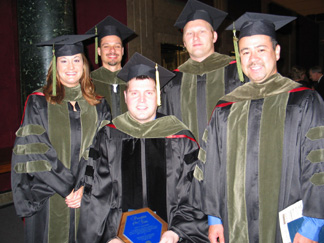 |
Joel Reddish, Pharm.D., seated, holds the preceptor award he received at the spring honors convocation. |
Dr. Reddish transferred that knowledge into practice – during his first year as a preceptor – to earn the 2005 Preceptor of the Year Award. The recipient of the award is selected by the graduating senior students and was presented at the Spring Honors Convocation.
“I really, really enjoy working with students. I’m not very far removed from where they are, and I know what it was like to be in their shoes,” said Dr. Reddish, a 2003 graduate of the College of Pharmacy. “I want to work with them, to get them involved and to push them, as well.”
During the four-week clerkship with Dr. Reddish, students learn the workings of the kidney and pancreas transplant unit of The Nebraska Medical Center, UNMC’s hospital partner. Dr. Reddish began working on the unit in July 2004, after completing a one-year pharmacy residency on the kidney/cardiac transplant unit at St. Luke’s Hospital in Kansas City, Mo.
“I was looking at positions at Johns Hopkins and here, and I thought that this program was more well-suited for me,” Dr. Reddish said. “This was a new position that was created, so there was an opportunity to suit the position to what I wanted it to be.”
Dr. Reddish hasn’t always known that being a transplant unit pharmacist – or pharmacy itself – was what he wanted to pursue.
A 1994 graduate of Crete High School, Dr. Reddish earned a bachelor’s degree from the University of Nebraska-Lincoln with a double major in biology and psychology. He then worked a year in a UNL animal behavior research laboratory before joining the College of Pharmacy in 1999. A behavioral science course at UNL, Dr. Reddish said, piqued his interest in pharmacy.
“We talked a lot about drugs and the different chemicals in your body,” Dr. Reddish said. “I explored the possibility of going to pharmacy school and decided to take the leap, so to speak.”
Upon beginning his studies at the College of Pharmacy, Dr. Reddish thought a job in the pharmacy at The Nebraska Medical Center would be a good way to get some experience in the profession.
Instead, he found his passion.
“Initially, I thought it would be great experience. I really didn’t know much about the difference between practicing pharmacy in a hospital, in an outpatient clinic or in another setting,” Dr. Reddish said. “As soon as I started working at the Medical Center, I loved it. As I went through pharmacy school, I knew I wanted to work in inpatient pharmacy.”
A four-week clerkship in the liver transplant unit during his senior year introduced Dr. Reddish to transplant pharmacy, an area that he quickly began to like and to appreciate. His residency cemented his plans to practice in a transplant unit.
“The kidney/cardiac unit during my residency program clicked with me, and I really enjoyed it,” Dr. Reddish said.
So, he jumped at the position with the kidney/pancreas unit at the Medical Center. The unit averages around 10 to 15 patients at any one time, but that number can range from a few patients to more than two-dozen.
During a normal day, Dr. Reddish reviews patient charts and suggests potential changes to their medicine regimens, collects and reviews data for multiple research projects, rounds with physicians and other health care team members, and performs various other duties. He said the dramatic improvement that patients can show after a successful transplant is part of what draws him to that area of health care.
“What amazes me so much is how much better someone can get, just a few days after a transplant. Their improvement is so dramatic” Dr. Reddish said. “To have your own little part of that is cool.”
With the clerkship students, Dr. Reddish gives them “Gold Star Questions” – one to answer during rounds and one to take home. He keeps a tally on how effectively the students answer the questions.
“The questions are difficult. They really make the students think,” Dr. Reddish said. “But, it also makes it fun. The students seem to enjoy the questions.”
As a student cited in nominating him for the award, “Dr. Reddish creates a stimulating, comfortable and fun environment for students to learn that promotes discussion and dialogue.”
In his free time, Dr. Reddish enjoys going to movies, hanging out with friends and playing golf.